List of heads of government of Russia
.jpeg)
Approximately 98 people have been head of the Russian government since its establishment in 1726. The chairman of government was a member of the Supreme Privy Council, which was created on 8 (19) February 1726 by Empress Catherine, and from 8 (20) September 1802 ministerial duties were allocated by the Committee of Ministers, which was established on in accordance with the proclamation of Emperor Alexander II. Beginning with Count Aleksandr Romanovich Vorontsov, the eldest of the officers was de facto chairman of the committee. Eight years after the inauguration of the manifest, the first de jure office holder was Count Nikolay Rumyantsev.[1] The Council of Ministers was unofficially formed in October 1857, as a result of Emperor Alexander II's reforms; its first session began on 19 (31) December 1857. Before the actual formation of that body on 12 (24) November 1861, the Emperor himself was in charge. The Council of Ministers consisted of chairmen of the State Council and the Committee of Ministers, as well as high-ranking officers appointed by the Emperor. The first session ended on 11 (23) December 1882, after the number of files to the Council greatly decreased.[2][3]
The Committee of Ministers functioned simultaneously with the second session of the Council of Ministers for six more months; Count Sergei Witte participated on both entities until the abolition of the committee on 23 April (5 May) 1906. Following that event, the duties of the committee were left to the Council of Ministers, until the formation of the Small Council in 1909, which also included deputy ministers. By the order of Emperor Nicholas II, the second session of the Council of Ministers began on 19 October (1 November) 1905, following the formation of the State Duma. Shortly after the February Revolution and the inception of the Russian Provisional Government on 2 (15) March 1917, Georgy Lvov from the Constitutional Democratic Party and Alexander Kerensky from the Socialist Revolutionary Party became joint Minister-Chairmen. The provisional Russian Republic was eventually replaced by the Russian Soviet Federative Socialist Republic (RSFSR) and the governmental body by the Council of People's Commissars, which was chaired from 1917–24 by Vladimir Lenin. That body was renamed Council of Ministers following a decree of the Supreme Council on 23 March 1946.
After the fall of the Soviet Union, Boris Yeltsin, as the President of the Russian Federation, was automatically appointed as the Head of Government of the Russian Federation in the first two years of his mandate. The latter body took the previous name "Council of Ministers", the chairman of which became Viktor Chernomyrdin from the Communist Party of the Russian Federation, replacing acting chairman Yegor Gaidar. According to the new constitution ratified on 25 December 1993, those two entities were separated. Since then, the head of that office takes the formal title "Chairmen of the Government" or colloquially "Prime Minister" (the only actual prime minister was Valentin Pavlov). Chernomyrdin resumed chairing the government, followed up by non-partisans and acting office holders. On 8 May 2008, Vladimir Putin took the office for a second term, now as a member of United Russia. Dmitry Medvedev has been the Chairman of the Government since 8 May 2012.[4]
The youngest head of government by his accession to office was Count Karl-Fridrikh Golshteyn-Gottorpsky, at age 26, and the oldest Count Pyotr Andreyevich Tolstoy, at age 81.
Before 1905
Since the 18th century, a modern system of public administration was going to be created in Russia, including the formation of bodies whose powers are similar to the powers of the modern Russian Government. In some cases, the naming of those bodies, such as the Committee of Ministers, was kept to date, but the functions of this body in public administration have been severely limited. They were mostly advisory bodies, and its chairman - decorative.[5]
| Portrait | Name (Birth–Death) | Term of office | Head of state | ||||
|---|---|---|---|---|---|---|---|
| Members of the Supreme Privy Council of the Russian Empire (1726–1730) | |||||||

| Duke Alexander Danilovich Menshikov (1673–1729) | 8 February 1726 | 8 September 1727 | Catherine I (1725–1727) Peter II .jpg) (1727–1730) Anna .jpg) (1730–1740) | |||
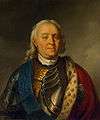
| Count Fyodor Matveyevich Apraksin (1661–1728) | 8 February 1726 | 10 November 1728 | ||||
.jpg)
| Count Gavriil Ivanovich Golovkin (1660–1734) | 8 February 1726 | 6 May 1727 | ||||
_%D0%9E%D1%81%D1%82%D0%B5%D1%80%D0%BC%D0%B0%D0%BD.jpg)
| Count Andrey Ivanovich Osterman (1686–1747) | 8 February 1726 | 6 May 1727 | ||||
.jpg)
| Knyaz Dmitry Mikhaylovich Golitsyn (1665–1737) | 8 February 1726 | 6 May 1727 | ||||
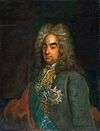
| Count Pyotr Andreyevich Tolstoy (1645–1729) | 8 February 1726 | 6 May 1727 | ||||
.jpg)
| Count Karl Fridrikh Golshteyn-Gottorpsky (1700–1739) | 8 February 1726 (or March 1726)[6] | 25 July 1727 | ||||
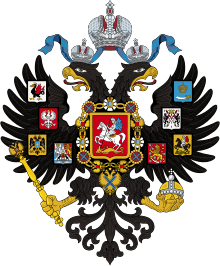
| Knyaz Alexey Grigoryevich Dolgorukov (?–1734) | 3 February 1728 | 4 March 1730 | ||||
.jpg)
| Knyaz Vasily Lukich Dolgorukov (1670–1739) | 6 April 1729 | 4 March 1730 | ||||
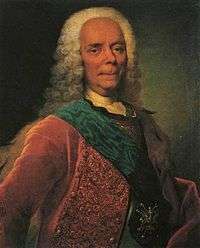
| Knyaz Vasily Vladimirovich Dolgorukov (1667–1746) | 19 January 1730 | 4 March 1730 | ||||

| Knyaz Mikhail Mikhailovich Golitsyn (1675–1730) | 19 January 1730 | 4 March 1730 | ||||
| Cabinet ministers of the Russian Empire (1731–1741) | |||||||
.jpg)
| Count Gavriil Ivanovich Golovkin (1660–1734) | 10 November 1731 | 20 January 1734 | Anna.jpg) (1730–1740) Ivan VI .jpg) (1740–1741) | |||
_%D0%9E%D1%81%D1%82%D0%B5%D1%80%D0%BC%D0%B0%D0%BD.jpg)
| Count Andrey Ivanovich Osterman (1686–1747) | 20 January 1734 | 10 November 1740 | ||||
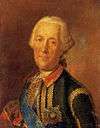
| Count Khristofor Antonovich Minikh (1683–1767) | 10 November 1740 | 3 March 1741 | ||||
_%D0%9E%D1%81%D1%82%D0%B5%D1%80%D0%BC%D0%B0%D0%BD.jpg)
| Count Andrey Ivanovich Osterman (1686–1747) (2nd time) | 3 March 1741 | 25 November 1741 | ||||
| Conferency ministers at the Highest Court of the Russian Empire (1756–1762) | |||||||
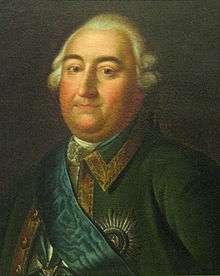
| Stepan Fyodorovich Apraksin (1702–1758) | 14 March 1756 | 1 October 1757 | Elizabeth (1741–1762) Peter III (1762) | |||

| Count Mikhail Petrovich Bestuzhev-Ryumin (1688–1760) | 14 March 1756 | 2 October 1757 | ||||
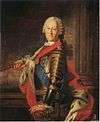
| Knyaz Mikhail Mikhailovich Golitsyn (1684–1764) | 14 March 1756 | 17 December 1757 | ||||
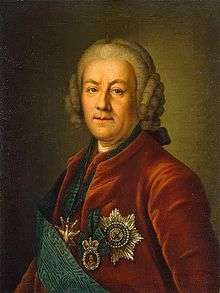
| Count Alexey Petrovich Bestuzhev-Ryumin (1693–1768) | 14 March 1756 | 14 February 1758 | ||||
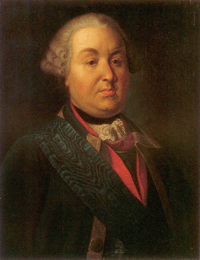
| Count Alexander Borisovich Buturlin (1694–1767) | 14 March 1756 | 17 October 1760 | ||||
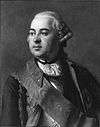
| Count Peter Ivanovich Shuvalov (1711–1762) | 14 March 1756 | 4 January 1762 | ||||
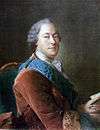
| Count Mikhail Illarionovich Vorontsov (1714–1767) | 14 March 1756 | 20 January 1762 | ||||
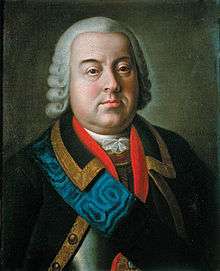
| Knyaz Nikita Yuryevich Trubetskoy (1699–1767) | 14 March 1756 | 20 January 1762 | ||||
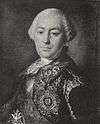
| Count Alexander Ivanovich Shuvalov (1710–1771) | 14 March 1756 | 20 January 1762 | ||||
| | Grand Duke Peter Fyodorovich Romanov (subsequently Emperor Peter III) (1728–1762) | 14 March 1756 | 28 January 1762 | ||||
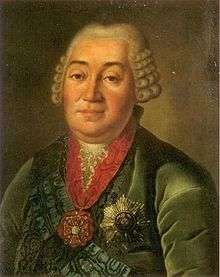
| Knyaz Yakov Petrovich Shakhovsky (1705–1777) | 16 September 1760 | 25 December 1761 | ||||
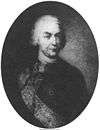
| Ivan Ivanovich Neplyuev (1693–1773) | 16 September 1760 | 20 January 1762 | ||||
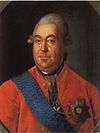
| Count Roman Illarionovich Vorontsov (1707–1783) | 28 December 1761 | 20 January 1762 | ||||
| Members of the Imperial Council of the Russian Empire (1762) | |||||||
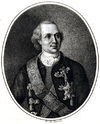
| Prince Georg Lyudwig Golshteyn-Gottorpsky (1719–1763) | 28 January 1762 | 28 June 1762 | Peter III (1762) | |||

| Count Pyotr Avgust Fridrikh Golshteyn-Beksky (1696–1775) | 28 January 1762 | 28 June 1762 | ||||

| Count Khristofor Antonovich Minikh (1683–1767) | 28 January 1762 | 28 June 1762 | ||||

| Knyaz Nikita Yuryevich Trubetskoy (1699–1767) | 28 January 1762 | 28 June 1762 | ||||

| Count Mikhail Illarionovich Vorontsov (1714–1767) | 28 January 1762 | 28 June 1762 | ||||

| Aleksandr Nikitich Vilbua (1713–1788) | 28 January 1762 | 28 June 1762 | ||||
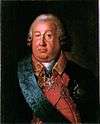
| Knyaz Mikhail Nikitich Volkonsky (1713–1788) | 28 January 1762 | 28 June 1762 | ||||
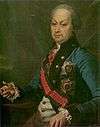
| Aleksey Petrovich Melgunov (1722–1788) | 28 January 1762 | 28 June 1762 | ||||
| Heads of Council Affairs at the Highest Court (Highest Council) of the Russian Empire (1768–1801) | |||||||

| Stepan Fyodorovich Strekalov (1728–1805) | 17 November 1768 | 1776 | Catherine II.jpg) (1762–1796) Paul  (1796–1801) | |||
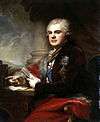
| Count Alexander Nikolayevich Samoylov (1744–1814) | 1776 | 1787 | ||||

| Ivan Andreyevich Veydemeyer (1752–1820) | 1787 | 18 November 1796 | ||||
.jpg)
| Gavriil Romanovich Derzhavin (1743–1816) | 18 November 1796 | 22 November 1796 | ||||

| Ivan Andreyevich Veydemeyer (1752–1820) (2nd time) | 18 November 1796 | 26 March 1801 | ||||
| Chairmen of the Committee of Ministers of the Russian Empire (1810–1903) | |||||||
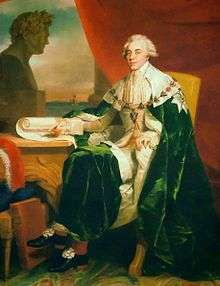
| Count Nikolay Petrovich Rumyantsev[lower-alpha 1] (1754–1826) | 1810 | 1812 | Alexander I.jpg) (1801–1825) Nicholas I 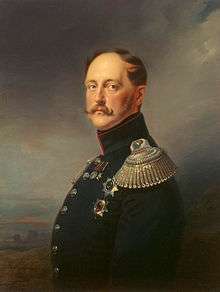 (1825–1855) Alexander II 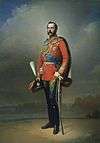 (1855–1881) Alexander III 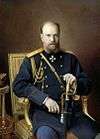 (1881–1894) St. Nicholas II .jpg) (1894–1917) | |||

| Count and Knyaz Nikolay Ivanovich Saltykov (1736–1816) | 29 March 1812[7] | 9 September 1812 (disputed)[lower-alpha 2] 16 May 1816 | ||||
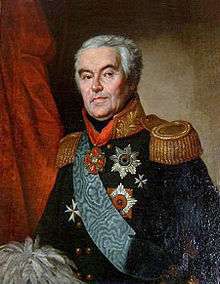
| Count Sergey Kuzmich Vyazmitinov (disputed)[lower-alpha 3] (1744–1819) | 9 September 1812 | 15 October 1816 | ||||
.jpg)
| Knyaz Pyotr Vasilyevich Lopukhin (1753–1827) | 25 May 1816[8] | 6 April 1827 | ||||

| Knyaz Viktor Pavlovich Kochubey (1768–1834) | 29 April 1827[9] | 3 June 1834 | ||||
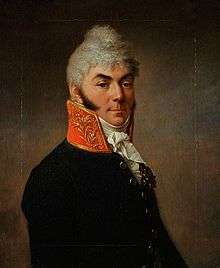
| Count Nikolay Nikolayevich Novosiltsev (1761–1838) | 11 July 1834[10] | 8 April 1838 | ||||
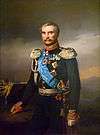
| Knyaz Illarion Vasilyevich Vasilchikov (1776–1847) | 9 April 1838[11] | 21 February 1847 | ||||
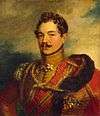
| Count Vasily Vasilyevich Levashov (1783–1848) | 31 December 1847[12] | 23 September 1848 | ||||

| Knyaz Alexander Ivanovich Chernyshyov (1785–1857) | 1 December 1848[13] | 5 April 1856[13] | ||||

| Knyaz Alexey Fyodorovich Orlov (1787–1862) | May 1857[14] | January 1861[15] | ||||
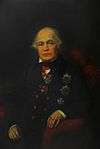
| Count Dmitry Nikolayevich Bludov (1785–1864) | 12 November 1861 | 19 February 1864 | ||||
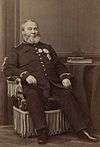
| Knyaz Pavel Pavlovich Gagarin (1789–1872) | 24 February 1864[16] | 21 February 1872 | ||||
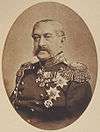
| Count Pavel Nikolayevich Ignatyev (1797–1879) | 21 February 1872[17] | 20 December 1879[17] | ||||

| Count Pyotr Aleksandrovich Valuyev (1815–1890) | 25 December 1879[18] | 4 October 1881[18] | ||||
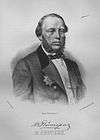
| Count Mikhail Khristoforovich Reytern (1820–1890) | 4 October 1881[19] | 30 December 1886[19] | ||||
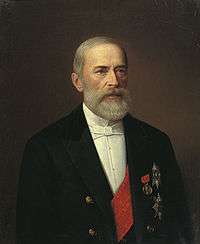
| Nikolay Khristianovich Bunge (1823–1895) | 1 January 1887[20] | 3 June 1895[20] | ||||
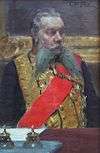
| Ivan Nikolayevich Durnovo (1834–1903) | 15 October 1895[21] | 29 May 1903 | ||||
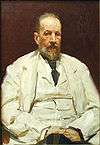
| Count Sergei Yulyevich Witte (1849–1915) | 16 August 1903[22] | 22 April 1906[22] | ||||
After 1905
The modern government type in Russia came after the establishment of the Council of Ministers on 1 November 1905, created for the "management and union action principal chiefs of departments on subjects like law and senior public administration", and modelled on the relevant institutions within the constitutional states, when all the ministries and directorates have been declared part of the unified state management; ministers no longer individual officials responsible only each for his actions and orders. The first Prime Minister was Count Sergei Witte, who was appointed on 6 November 1905.[23]
| Colour key (for political parties) |
|---|
| Portrait | Name (Birth–Death) |
Term of office | Government | Political party | Head of state | |||
|---|---|---|---|---|---|---|---|---|
| Russian Empire (1721-1917) | ||||||||
| 1 |  |
Count Sergey Yulyevich Witte (1849–1915) |
6 November 1905 | 5 May 1906 | Witte | Independent | St. Nicholas II.jpg) (1894–1917) | |
| 2 | 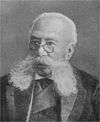 |
Ivan Logginovich Goremykin (1839–1917) |
5 May 1906 | 21 July 1906 | Goremykin I | Independent | ||
| 3 | 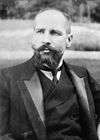 |
Pyotr Arkadyevich Stolypin (1862–1911) |
21 July 1906 | 18 September 1911 | Stolypin | Independent | ||
| 4 | 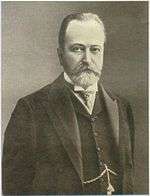 |
Count Vladimir Nikolayevich Kokovtsov (1853–1943) |
18 September 1911 | 22 September 1911 | Acting | Independent | ||
| 22 September 1911 | 12 February 1914 | Kokovtsov | ||||||
| 5 |  |
Ivan Logginovich Goremykin (1839–1917) |
12 February 1914 | 2 February 1916 | Goremykin II | Independent | ||
| 6 | .jpg) |
Baron Boris Vladimirovich Shtyurmer (1848–1917) |
2 February 1916 | 23 November 1916 | Styurmer | Independent | ||
| 7 | 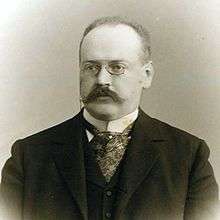 |
Alexander Fyodorovich Trepov (1862-1928) |
23 November 1916 | 20 January 1917 | Trepov | Independent | ||
| 8 | 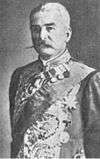 |
Prince Nikolai Dmitriyevich Golitsyn (1850-1925) |
20 January 1917 | 12 March 1917 | Golitsyn | Independent | ||
| Russian Republic (1917) | ||||||||
| 9 |  |
Prince Georgy Yevgenyevich Lvov (1861–1925) |
15 March 1917 | 20 July 1917 | Lvov | Constitutional Democratic Party | Georgy Lvov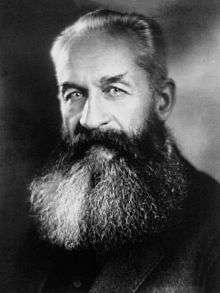 (1917) | |
| 10 | 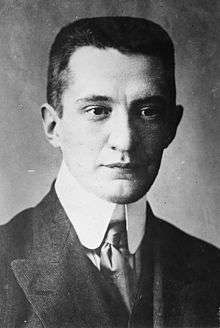 |
Alexander Fyodorovich Kerensky (1881–1970) |
21 July 1917 | 1 September 1917 | Kerensky I | Socialist Revolutionary Party | Alexander Kerensky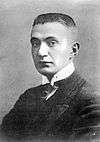 (1917) | |
| 1 September 1917 | 7 November 1917 | Kerensky II | ||||||
| Russian State (1918–1920) (De Jure)[24] | ||||||||
| — | .jpg) |
Pyotr Vasilyevich Vologodsky (1863–1925) |
4 November 1918 | 22 November 1919 | Vologodsky In exile |
Socialist Revolutionary Party | Alexander Kolchak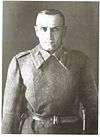 (1918 — 1920) | |
| — | .jpg) |
Viktor Nikolayevich Pepelyayev (1885-1920) |
22 November 1919 | 4 January 1920 | Pepelyayev In exile |
Independent | ||
| Russian Soviet Federative Socialist Republic (1917-1991) | ||||||||
| 11 |  |
Vladimir Ilyich Ulyanov ("Lenin") (1870–1924) |
9 November 1917 | 21 January 1924 | Lenin | Communist Party | Vladimir Lenin%2C_1918.png) (1917–1924) | |
| 12 |  |
Alexey Ivanovich Rykov (1881–1938) |
2 February 1924 | 18 May 1929 | Rykov | Communist Party | Joseph Stalin (1924–1953) | |
| 13 | 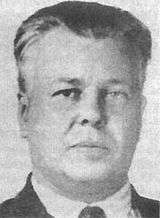 |
Sergey Ivanovich Syrtsov (1883–1937) |
18 May 1929 | 3 November 1930 | Syrtsov | Communist Party | ||
| 14 | 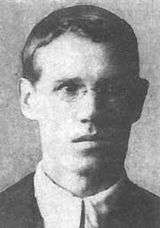 |
Daniil Yegorovich Sulimov (1890–1937) |
3 November 1930 | 27 July 1937 | Sulimov | Communist Party | ||
| 15 |  |
Nikolay Alexandrovich Bulganin (1895–1975) |
27 July 1937 | 17 September 1938 | Bulganin | Communist Party | ||
| 16 | 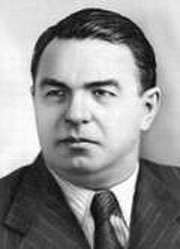 |
Vasily Vasilyevich Vakhrushev (1902–1947) |
29 July 1939 | 2 June 1940 | Vakhrushev | Communist Party | ||
| 17 | 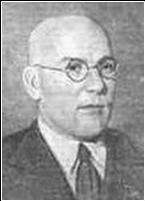 |
Ivan Sergeyevich Khokhlov (1895–1973) |
2 June 1940 | 5 May 1942 | Khokhlov | Communist Party | ||
| — | .svg.png) |
Konstantin Dmitrievich Pamfilov (1901–1943) |
5 May 1942 | 2 May 1943 | Acting | Communist Party | ||
| 18 |  |
Alexey Nikolayevich Kosygin (1904–1980) |
2 May 1943 | 23 March 1946 | Kosygin | Communist Party | ||
| 19 | .svg.png) |
Mikhail Ivanovich Rodionov (1907–1950) |
23 March 1946 | 9 March 1949 | Rodionov | Communist Party | ||
| 20 | .svg.png) |
Boris Nikolayevich Chernousov (1908–1978) |
9 March 1949 | 20 October 1952 | Chernousov | Communist Party | ||
| 21 | .svg.png) |
Alexander Mikhailovich Puzanov (1906–1998) |
20 October 1952 | 24 January 1956 | Puzanov | Communist Party | ||
Nikita Khrushchev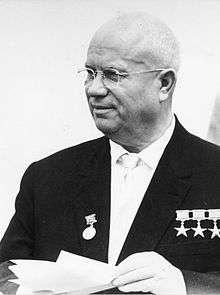 (1953–1964) | ||||||||
| 22 | .svg.png) |
Mikhail Alexeyevich Yasnov (1906–1991) |
24 January 1956 | 19 December 1957 | Yasnov | Communist Party | ||
| 23 | .svg.png) |
Frol Romanovich Kozlov (1908–1965) |
19 December 1957 | 31 March 1958 | Kozlov | Communist Party | ||
| 24 | .svg.png) |
Dmitry Stepanovich Polyansky (1917–2001) |
31 March 1958 | 23 November 1962 | Polyansky | Communist Party | ||
| 25 | .svg.png) |
Gennady Ivanovich Voronov (1910–1994) |
23 November 1962 | 23 July 1971 | Voronov | Communist Party | ||
Leonid Brezhnev.jpg) (1964–1982) | ||||||||
| 26 |  |
Mikhail Sergeyevich Solomentsev (1913–2008) |
28 July 1971 | 24 June 1983 | Solomentsev | Communist Party | ||
Yuri Andropov (1982–1984) | ||||||||
| 27 |  |
Vitaly Ivanovich Vorotnikov (1926–2012) |
24 June 1983 | 3 October 1988 | Vorotnikov | Communist Party | ||
Konstantin Chernenko (1984–1985) | ||||||||
Mikhail Gorbachev.jpg) (1985–1991) | ||||||||
| 28 |  |
Alexander Vladimirovich Vlasov (1932–2002) |
3 October 1988 | 15 June 1990 | Vlasov | Communist Party | ||
| 29 |  |
Ivan Stepanovich Silayev (1930–) |
15 June 1990 | 11 July 1991 | Silayev I | Communist Party | ||
| 12 July 1991 | 26 September 1991 | Silayev II | ||||||
| — |  |
Oleg Ivanovich Lobov (1937–) |
26 September 1991 | 6 November 1991 | Acting | Communist Party | ||
| Russian Federation (since 1991) | ||||||||
| — |  |
Boris Nikolayevich Yeltsin (1931–2007) |
6 November 1991 | 15 June 1992 | Yeltsin—Gaidar | Independent | ||
Boris Yeltsin (1991–1999) | ||||||||
| — |  |
Yegor Timurovich Gaidar (1956–2009) |
15 June 1992 | 14 December 1992 | Independent | |||
| 30 |  |
Viktor Stepanovich Chernomyrdin (1938–2010) |
14 December 1992 | 9 August 1996 | Chernomyrdin I | Our Home – Russia | ||
| 10 August 1996 | 23 March 1998 | Chernomyrdin II | ||||||
| 31 | 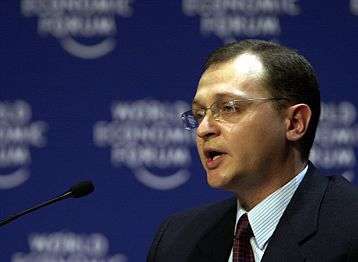 |
Sergey Vladilenovich Kiriyenko (1962–) |
23 March 1998 | 24 April 1998 | Acting | Independent | ||
| 24 April 1998 | 23 August 1998 | Kiriyenko | ||||||
| — |  |
Viktor Stepanovich Chernomyrdin (1938–2010) |
23 August 1998 | 11 September 1998 | Acting | Our Home – Russia | ||
| 32 |  |
Yevgeny Maximovich Primakov (1929–2015) |
11 September 1998 | 12 May 1999 | Primakov | Fatherland – All Russia | ||
| 33 | .jpg) |
Sergey Vadimovich Stepashin (1952–) |
12 May 1999 | 19 May 1999 | Acting | Independent | ||
| 19 May 1999 | 9 August 1999 | Stepashin | ||||||
| 34 | .jpeg) |
Vladimir Vladimirovich Putin (1952–) |
9 August 1999 | 16 August 1999 | Acting | Unity | ||
| 16 August 1999 | 7 May 2000 | Putin I | Vladimir Putin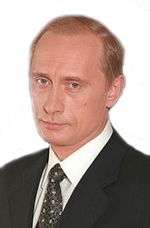 (1999–2008) | |||||
| 35 | 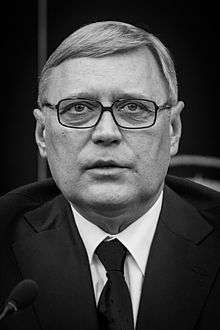 |
Mikhail Mikhailovich Kasyanov (1957–) |
7 May 2000 | 17 May 2000 | Acting | Independent | ||
| 17 May 2000 | 24 February 2004 | Kasyanov | ||||||
| — | 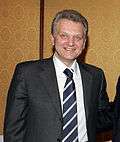 |
Viktor Borisovich Khristenko (1957–) |
24 February 2004 | 5 March 2004 | Acting | Independent | ||
| 36 | .jpeg) |
Mikhail Yefimovich Fradkov (1950–) |
5 March 2004 | 7 May 2004 | Fradkov I | Independent | ||
| 7 May 2004 | 12 May 2004 | Acting | ||||||
| 12 May 2004 | 14 September 2007 | Fradkov II | ||||||
| 37 |  |
Viktor Alexeyevich Zubkov (1941–) |
14 September 2007 | 8 May 2008 | Zubkov | United Russia | ||
| 38 | .jpeg) |
Vladimir Vladimirovich Putin (1952–) |
8 May 2008 | 7 May 2012 | Putin II | United Russia | Dmitry Medvedev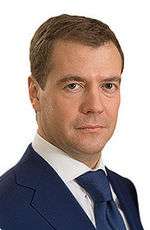 (2008–2012) | |
| — |  |
Viktor Alexeyevich Zubkov (1941–) |
7 May 2012 | 8 May 2012 | Acting | United Russia | Vladimir Putin.jpg) (2012–) | |
| 39 |  |
Dmitry Anatolyevich Medvedev (1965–) |
8 May 2012 | Incumbent | Medvedev | United Russia | ||
Living former Prime Ministers
As of December 2016, there are seven living former Prime Ministers. The most recent death of a former Prime Minister was that of Yevgeny Primakov (1998–1999) on 26 June 2015, aged 85.
| Name | Term of office | Born |
|---|---|---|
| Ivan Silayev | 1990–1991 | 21 October 1930 |
| Sergey Kiriyenko | 1998 | 26 July 1962 |
| Sergei Stepashin | 1999 | 2 March 1952 |
| Vladimir Putin | 1999–2000 and 2008–2012 | 7 October 1952 |
| Mikhail Kasyanov | 2000–2004 | 8 December 1957 |
| Mikhail Fradkov | 2004–2007 | 1 September 1950 |
| Viktor Zubkov | 2007–2008 | 15 September 1941 |
Timeline
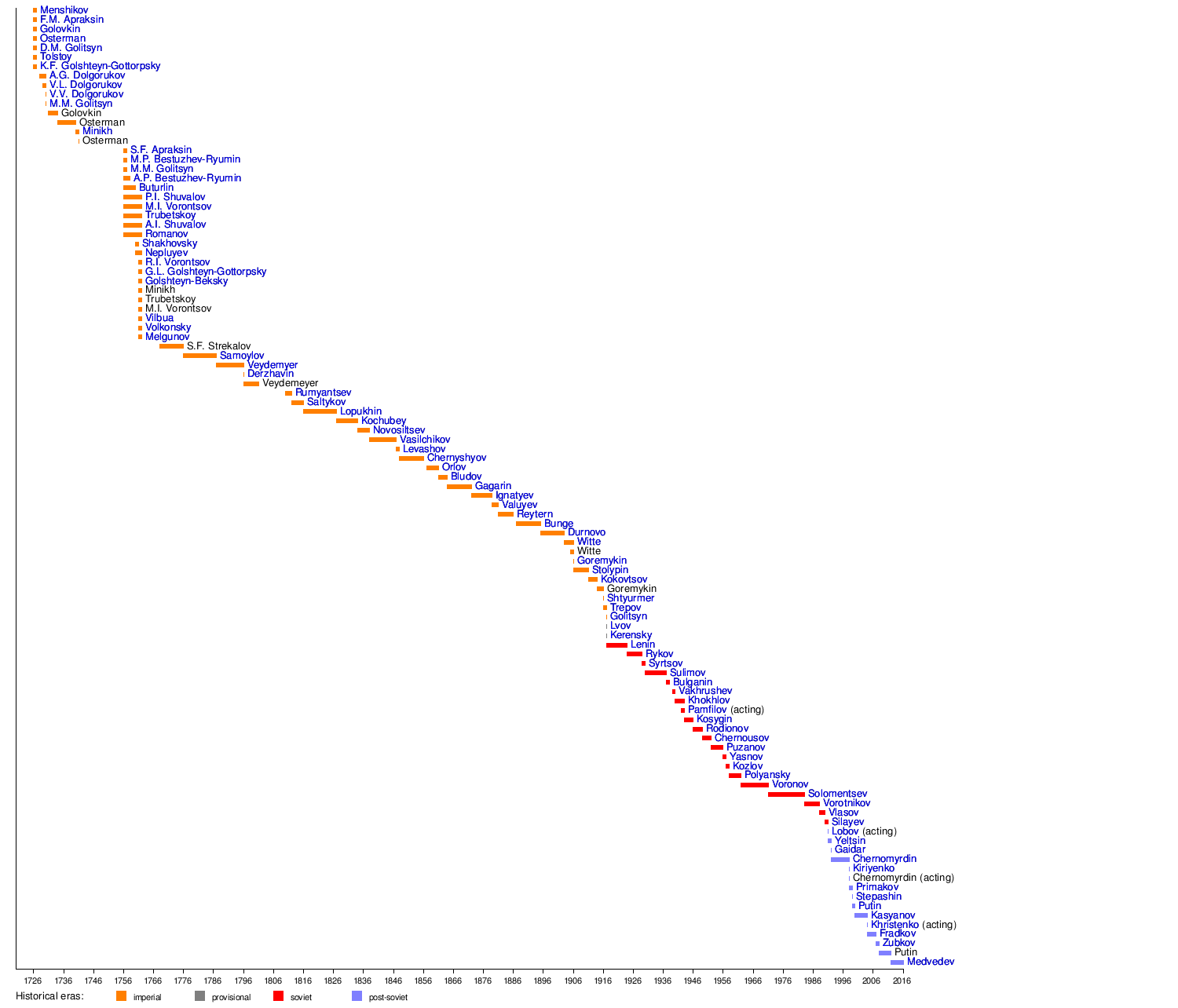
See also
- Chairman of the Government of the Russian Federation
- Politics of Russia
- Government of Russia
- Premier of the Soviet Union
- Bald–hairy
Footnotes
- ↑ De facto (unofficial) Chairman of the Committee of Ministers from 8 September 1802 to 1809 was Alexander Romanovich Vorontsov
- ↑ Sources which list Vyazmitinov as Saltykov's successor state a date of 9 September 1812; other sources assert that Saltykov was in office until his death
- ↑ Some sources (such as the Large Soviet Encyclopedia) list Vyazmitinov as committee minister, while other (such as the History of the Fatherland encyclopedia) don't mention him at all and instead list Lopukhin as the successor of Saltykov
Notes
- ↑ "Комитет министров". Brockhaus and Efron Encyclopedic Dictionary: In 86 Volumes (82 Volumes and 4 Additional Volumes). St. Petersburg. 1890–1907.
- ↑ "Совет министров". Brockhaus and Efron Encyclopedic Dictionary: In 86 Volumes (82 Volumes and 4 Additional Volumes). St. Petersburg. 1890–1907.
- ↑ "Ministers' Council established in Russia". Presidential Library Named After Boris Yeltsin. Retrieved 10 August 2014.
- ↑ "The Russian Government – Dmitry Medvedev". Government of the Russia Federation. Retrieved 4 April 2014.
- ↑ В России был учреждён Совет Министров
- ↑ "Верховный тайный совет". Brockhaus and Efron Encyclopedic Dictionary: In 86 Volumes (82 Volumes and 4 Additional Volumes). St. Petersburg. 1890–1907.
- ↑ Салтыков, князь Николай Иванович [Knyaz Nikolay Ivanovich Saltykov] (in Russian). Retrieved 7 April 2014.
- ↑ Неизвестная Фемида : документы, события, люди [The Unknown Themis: Documents, Events, People] (in Russian). ОЛМА Медиа Групп. 2003. p. 93. ISBN 978-5-224-04224-1.
- ↑ Кочубей, князь Виктор Павлович [Knyaz Viktor Pavlovich Kochubey] (in Russian). Retrieved 8 April 2014.
- ↑ B. V. Ananych, ed. (2008). Управленческая элита Российской империи: история министерств, 1802–1917 [Ruling Elite of the Russian Empire: History of Ministries, 1802–1917] (in Russian). "Лики России".
- ↑ Васильчиков Илларион Васильевич — Биографический указатель [Illarion Vasilyevich Vasilchikov – Biography] (in Russian). Archived from the original on 9 February 2014. Retrieved 5 April 2014.
- ↑ Vladimir Nikolayevich Balyazin; Voldemar Nikolayevich Balyazin (2008). Царский декамерон: От Николая I до Николая II. Исторические книги В.Н. Балязина (Historical Books by V. N. Balyazin) (in Russian). 2. ОЛМА Медиа Групп. p. 49. ISBN 978-5-373-01976-7.
- 1 2 Александр Иванович Чернышев — Биографический указатель [Aleksandr Ivanovich Chernyshov] (in Russian). Retrieved 5 April 2014.
- ↑ Землевладельцы Панинского района. Князь Орлов Алексей Фёдорович [Landowners of the Panin Rayon. Knyaz Alexey Fyodorovich Orlov] (in Russian). Retrieved 9 April 2014.
- ↑ Орлов князь Алексей Федорович [Knyaz Aleksey Fyodorovich Orlov] (in Russian). Archived from the original on 7 April 2014. Retrieved 4 April 2014.
- ↑ Павел Павлович Гагарин [Pavel Pavlovich Gagarin] (in Russian). Russian Empire. Archived from the original on 7 April 2014. Retrieved 5 April 2014.
- 1 2 Игнатьев Павел Николаевич [Pavel Nikolayevich Ignatyev] (in Russian). Russian Empire. Archived from the original on 7 April 2014. Retrieved 5 April 2014.
- 1 2 Валуев Петр Александрович [Pyotr Aleksandrovich Valuyev] (in Russian). Russian Empire. Archived from the original on 7 April 2014. Retrieved 5 April 2014.
- 1 2 Рейтерн Михаил Христофорович [Mikhail Khristoforovich Reytern] (in Russian). Russian Empire. Archived from the original on 7 April 2014. Retrieved 6 April 2014.
- 1 2 Бунге Николай Христианович [Nikolay Khristianovich Bunge] (in Russian). Russian Empire. Archived from the original on 8 April 2014. Retrieved 7 April 2014.
- ↑ Дурново Иван Николаевич [Ivan Nikolayevich Durnovo] (in Russian). Russian Empire. Archived from the original on 8 April 2014. Retrieved 7 April 2014.
- 1 2 "Витте Сергей Юлиевич (sic!)" [Sergey Yuliyevich (sic!) Witte] (in Russian). Russian Empire. Archived from the original on 8 April 2014. Retrieved 7 April 2014.
- ↑ Преобразован Совет министров Российской империи
- ↑ State created by the White movement during the Civil War and laid claim to the entire territory of Russia, however, controlled only a small part of the country.
References
- S. M. Seredonin, ed. (1902). Т. 1 : Комитет министров в царствование императора Александра Первого (1802 г. сентября 8 – 1825 г. ноября 19). – 1902. [Vol. 1: Committee of Ministers During the Reign of Emperor Aleksandr the First (8 September 1802 – 19 November 1825). – 1902] (in Russian). 1. Government Public Historical Library of Russia.
- B. Yu. Ivanov, B. M. Karev, E. I. Kuksina, A. S. Oreshnikov, O. V. Sukhareva, eds. (1999). История отечества [History of the Fatherland] (in Russian). Moscow: Большая Российская энциклопедия (Large Russian Encyclopedia). pp. 554–576.
- K. K. Arsenyev, ed. (1911–1916). Новый энциклопедический словарь [New Encyclopedic Dictionary] (in Russian). 1–29. Saint Petersburg: F. A. Brockhaus and I. A. Efron.
- A. A. Polovtsov, ed. (1896–1918). Русский биографический словарь (Russian Biographical Dictionary) (in Russian). Saint Petersburg: Russian Imperatorial Historical Society of Saint Petersburg

